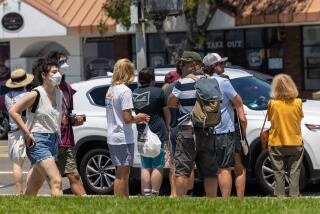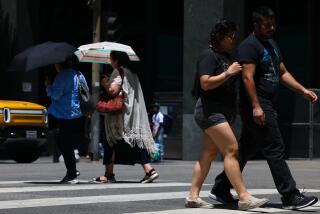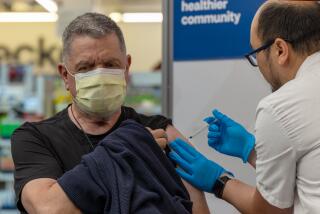CDC suggests checking employees’ temperatures daily in Silicon Valley and Seattle
- Share via
SAN FRANCISCO — Regular checks of temperature and cough are now being recommended for anyone entering workplaces, schools and childcare centers in the nation’s two areas hit hardest by the coronavirus pandemic — Silicon Valley and the Seattle area.
The guidelines also suggest canceling large gatherings of more than 250 people generally, and canceling gatherings of 10 or more people for organizations that serve high-risk communities, like those with diabetes, a weakened immune system, disease of the kidney, liver, heart, or lung, and those who are pregnant. Those in their 70s can have quadruple the risk of death as that of the general population if they are infected.
Churches and other faith-based and community gatherings should consider canceling meetings of any size and move to video-accessible venues or postpone or cancel events, the recommendations say.
The suggestions by the U.S. Centers for Disease Control and Prevention for the next 30 days are urgent to protect the already burdened healthcare system in both regions, officials said, to protect against the new coronavirus, which can cause an infection of the lungs and in critical cases, cause people to go in respiratory failure, septic shock and multiple organ failure.
Santa Clara County has reported 45 cases of coronavirus and one death, a woman in her 60s with underlying medical conditions. That is the largest case count of any county in California. King County, which includes Seattle, has reported 234 cases and 26 deaths, with 22 of the deaths associated with an outbreak at a single nursing home.
Gatherings of fewer than 250 will also be prohibited in King County unless organizers ensure social distancing, sanitation and health checks.
“Substantial interventions for both community and health care settings should be implemented at this time, based on the urgency of protecting the healthcare system with expected rise in cases,” the CDC said in memos for Silicon Valley and Washington state’s King, Pierce and Snohomish counties.
While about 81% of those infected are estimated to have mild symptoms, about 14% have severe illness and 5% have critical symptoms. Babies, toddlers and children generally have no signs of illness or symptoms, but older adults and those with underlying health conditions are at a substantially greater risk for severe illness.
Workplaces
For workplaces, the CDC suggested regular health checks for anyone arriving at work daily, such as checks of temperature and whether someone has a cough. They also suggested distancing workers away from each other, staggering work schedules, encouraging staff to telecommute, limiting in-person meetings and regularly disinfecting all eating areas in break rooms.
Schools and childcare centers
The CDC also recommended screening schoolchildren and school and childcare staff for temperature and respiratory symptoms regularly. School-wide assemblies should be canceled; mixing of classes should be reduced by staggering recess and arrival and dismissal times at school. Spring breaks could start early or be extended by an extra week to allow healthcare facilities time to prepare for a surge in sick people.
Churches and community groups
Churches and community groups should try to keep people more than 6 feet from each other and reduce activities like services and congregations — especially for groups serving those at higher risk of severe illness. Consider offering a call-in or video conferencing option, the agency said.
Hospitals, nursing homes, long-term care facilities
Healthcare facilities should restrict all visitors to reduce transmission of the virus within the facility, while allowing exceptions for those visiting people at the end of their life. Facilities may need to triage patients before they enter facilities, such as in the parking lot or by phone, to limit unnecessary healthcare visits, the agency said.
Assisted living facilities
Assisted living facilities and senior living facilities should consider longer-term closure or quarantine in certain situations, and short-term closures for cleaning and contact tracing if needed. They may want to consider suspending new admissions, and staff should wear masks and wash hands thoroughly before entering and after leaving rooms of inhabitants to prevent the risk of spreading the virus.
It may be helpful to stagger meals and activities and limit programs with staff outside the center, the CDC said.
Everyone
Ensure a 30-day supply of needed medicine. Those at risk of severe illness should stay at home and avoid travel, church attendance and social events with 10 or more people, the CDC said.
Alex Azar, the U.S. health and human services secretary, said that while new coronavirus cases in China have slowed, the coronavirus outbreak in the United States is just beginning — and it’s important to take steps to slow the spread of the virus.
“We are seeing a real explosion of cases in Europe. We’re seeing increasing cases here in the United States,” Azar said on ABC’s Good Morning America Wednesday. “We’re still, I would say, in the beginnings of the spread of this disease in the United States.
“We’re going to see more cases. This is a virus. This will spread. We need to take steps to slow that, buy ourselves time. Every day we buy is a valuable day.”
More to Read
Sign up for Essential California
The most important California stories and recommendations in your inbox every morning.
You may occasionally receive promotional content from the Los Angeles Times.












